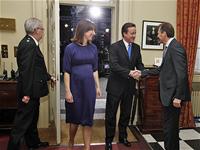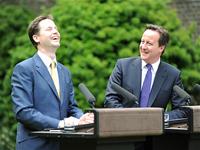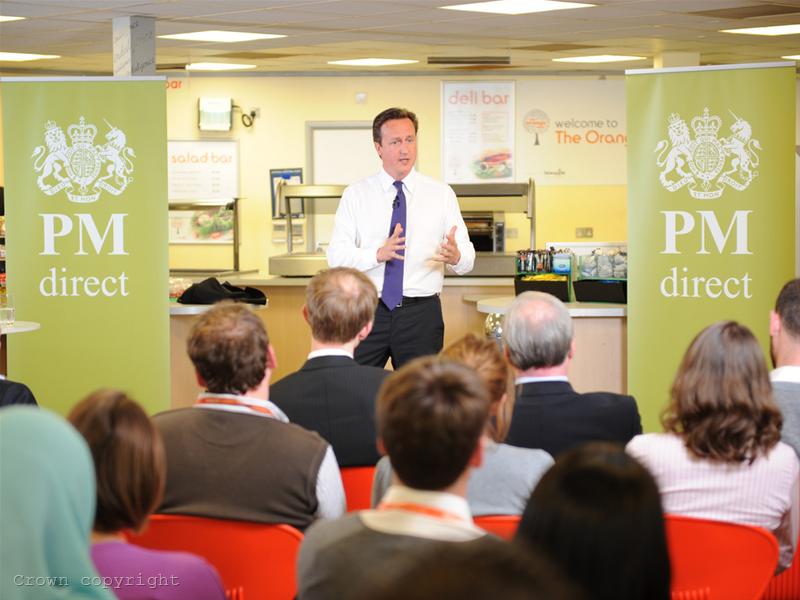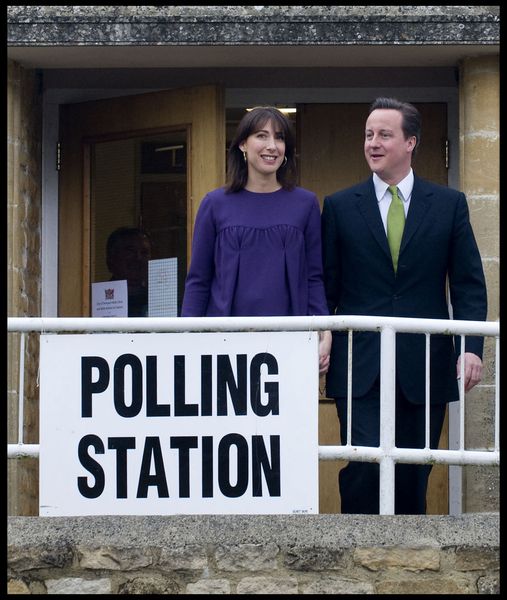Tradition + Continuity = Stability
Adelina Marini, May 14, 2010
 For a foreign observer, especially for someone coming from a country that has not gained its democracy but has got it for granted, the transfer of power in Great Britain appears to be an extremely impressive event. Not only because one can see a full manifestation of the famous British traditions but also because one comes to understand what impact they have on society. It is worth mentioning also the role of media in Britain which made each viewer on the planet a participant to the change of hosts in Downing Street 10, although they complained that for the last 100 years there was no change and nothing "scandalous" happened which made this ceremony another boring event.
For a foreign observer, especially for someone coming from a country that has not gained its democracy but has got it for granted, the transfer of power in Great Britain appears to be an extremely impressive event. Not only because one can see a full manifestation of the famous British traditions but also because one comes to understand what impact they have on society. It is worth mentioning also the role of media in Britain which made each viewer on the planet a participant to the change of hosts in Downing Street 10, although they complained that for the last 100 years there was no change and nothing "scandalous" happened which made this ceremony another boring event.
After parliamentary elections on May 6 (a working day), which were inconclusive for the party that gained most of the votes - the Conservatives - intense and almost restless negotiations started with the third party - the Liberal Democrats of Nick Clegg. The negotiations were tense because both parties were rivals during the campaign and had some serious differences on key issues.
Four days later the leader of the second party - the Labour - Prime Minister Gordon Brown resigned as a party leader and on the next day he resigned as Prime Minister too. Thus he cleared the way for the tories and libdems to invest more efforts in reaching an agreement.
And on Tuesday evening we became witnesses of a very interesting ceremony. Gordon Brown appeared before a great lot of journalists and cameras in front of Downing Street 10 to announce his resignation. A little before that he did the same before his party fellows. What impressed most was the smile on Gordon Brown's face almost all the time during his statement in Labour's headquarters - something not typical for Mr Brown who is famous in Britain as the man who almost never smiles.
Later, together with his wife and their two children they waved smiling to the audience and left their recent home. Then they went with the black jaguar of the Prime Minister to the Buckingham palace to inform the Queen about the resignation. All this was closely followed by British television stations, by lots of cameras all over central London and by a helicopter. And what might appear shocking to us - all the way to the Buckingham palace (which is not very long but it passes through the entire city centre) the black jaguar moved pursued by only one car, stayed in traffic jams, patiently waited for the traffic lights - no panic, no sirens and blocking of traffic, no policemen to demonstrate to voters that they are no longer needed.
The same happened with the silver jaguar with which David Cameron and his  wife Samantha went a little bit later to see Queen Elisabeth II in order the Conservatives' leader to receive an official mandate to form a government. On their way back to Downing Street 10 they were again closely followed until the very last detail. Before entering his future home, the new British Prime Minister David Cameron made a short statement, thanking the previous government for their work and making a short description of the main issues on which his cabinet would start immediate work. In that evening of May 11 the members of the government were not clear yet, nor was clear what the partnership with the libdems would be or their programme for government would be.
wife Samantha went a little bit later to see Queen Elisabeth II in order the Conservatives' leader to receive an official mandate to form a government. On their way back to Downing Street 10 they were again closely followed until the very last detail. Before entering his future home, the new British Prime Minister David Cameron made a short statement, thanking the previous government for their work and making a short description of the main issues on which his cabinet would start immediate work. In that evening of May 11 the members of the government were not clear yet, nor was clear what the partnership with the libdems would be or their programme for government would be.
On May 12 it became clear that Nick Clegg would become a deputy prime minister. And one more very important thing became clear that day too - both parties (Conservative and Liberal Democratic Party) had reached a coalition agreement which was duly published by both parties and given to journalists before the joint news conference in the early afternoon of Wednesday in the garden of Downing Street 10.
 The agreement is 7 pages long and covers 11 topics: deficit reduction, spending review, tax measures, banking reform, immigration, political reform, pensions and welfare, education, relations with the EU, civil liberties and environment. The deal describes in detail relations between the two parties on each of these topics. On some of them the libdems keep their right to abstain: tax measures, education, environment and more specifically regarding their opposition to nuclear power.
The agreement is 7 pages long and covers 11 topics: deficit reduction, spending review, tax measures, banking reform, immigration, political reform, pensions and welfare, education, relations with the EU, civil liberties and environment. The deal describes in detail relations between the two parties on each of these topics. On some of them the libdems keep their right to abstain: tax measures, education, environment and more specifically regarding their opposition to nuclear power.
The plans of the coalition government in essence foresee a serious reduction of the fiscal deficit in the next five years of Parliament. These efforts will be supported by a serious analysis of budgetary spending with a focus on its reduction. Tax reliefs are also planned, including reduction of Inheritance Tax. An important element of the deal is the agreement for a reform of the banking system in order to avoid, as is written in the document, a repeat of Labour’s financial crisis. For the purpose a bank levy will be introduced.
Detailed proposals for tough actions will be presented to tackle unacceptable bonuses in the financial services sector. The purpose of the proposals is to guarantee that such a measure would lead to effective reduction of risk. Separately, an independent commission will be established to investigate the complex issue of separating retail and investment banking. The aim of this idea is to reduce systemic risks in banking system. Both parties have agreed also on the need to reform the regulation system. One of the proposals is Bank of England (Britain's central bank) to be given control of macro-prudential regulation and oversight of micro-prudential regulation.
What seems to be of interest for Britain's European partners to know is that both parties firmly rule out the possibility the UK to join the single currency within the duration of the coalition agreement.
On another topic which proved to be a central one during the campaign -  immigration - the coalition partners have agreed to introduce an annual limit on the number of economic immigrants from non-European countries. But a mechanism to implement this limit is yet to be developed.
immigration - the coalition partners have agreed to introduce an annual limit on the number of economic immigrants from non-European countries. But a mechanism to implement this limit is yet to be developed.
Quite interesting are the plans for political reform. A 5-year fixed term of Parliament is to be introduced. The coalition government will put a binding motion before the House of Commons in the first days following this agreement stating that the next general election will be held on the first Thursday of May 2015. This legislation will also provide for dissolution if 55% or more of the House votes in favour. Fixing the term of Parliament gives the government the opportunity to start planning its key legislation carefully without a rush, which guarantees additional stability and certainty.
Another pre-election promise the tories and libdems plan to realise is to bring forward a Referendum Bill on electoral reform, which includes provision for the introduction of the Alternative Vote. The current House of Commons has been elected according to the first-past-the-post system. And another very important thing - a possibility for recall of MPs will be introduced together with by-election if an MP was found to have engaged in serious wrongdoing. In order to cause a recall a petition calling for a by-election signed by 10% of his or her constituents will be needed.
 In order to avoid electoral fraud both parties have agreed to speed up the implementation of individual voter registration. Together with this a statutory register of lobbyists will be introduced as well as a detailed agreement for limiting donations and reforming party funding in order to remove big money from politics.
In order to avoid electoral fraud both parties have agreed to speed up the implementation of individual voter registration. Together with this a statutory register of lobbyists will be introduced as well as a detailed agreement for limiting donations and reforming party funding in order to remove big money from politics.
Not a less ambitious is the intention of the new government to grant bigger financial autonomy to local governments and community groups.
There a lot other interesting intentions in the agreement, a large part of which were part of the pre-election platforms of both parties. They all are worth reading by our politicians and by everyone who wants to live better, to force the government to report before voters and, most of all, to have a clear idea what is the future of the country in the next 5 years (in our case 4 years). And for our media colleagues this is a very useful paper to read too because when we know what to expect from the ruling parties this would give us a leverage to press them stick to their commitments. Because, after all, this is a matter not only of political survival of each party and leader but of the long-term development of the country.
 | © Crown copyright
| © Crown copyright | © Andrew Parsons
| © Andrew Parsons | © ITV 1
| © ITV 1